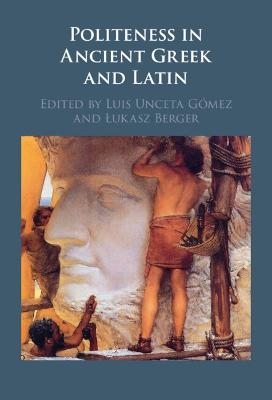
Politeness in Ancient Greek and Latin
Cambridge University Press (Verlag)
978-1-009-12303-7 (ISBN)
Politeness serves to manage social relations or is wielded as an instrument of power. Through good manners, people demonstrate their educational background and social rank. This is the first book to bring together the most recent scholarship on politeness and impoliteness in Ancient Greek and Latin, signalling both its universal and its culture-specific traits. Leading scholars analyse texts by canonical classical authors (including Plato, Cicero, Euripides, and Plautus), as well as non-literary sources, to provide glimpses into the courtesy and rudeness of Greek and Latin speakers. A wide range of interdisciplinary approaches is adopted, namely pragmatics, conversation analysis, and computational linguistics. With its extensive introduction, the volume introduces readers to one of the most dynamic fields of Linguistics, while demonstrating that it can serve as an innovative tool in philological readings of classical texts.
Luis Unceta Gómez is Senior Lecturer in Latin Philology at the Universidad Autónoma de Madrid. His research interests focus on Latin semantics and pragmatics, and especially linguistic politeness, topics on which he has published extensively. Łukasz Berger is a lecturer in Classics at the Adam Mickiewicz University in Poznań. His research interests are pragmatic aspects of dialogue in Roman comedy.
Part I. Introduction: 1. Im/Politeness Research in Ancient Greek and Latin: Concepts, Methods, Data Luis Unceta Gómez and Łukasz Berger; Part II. The Expression of Im/Politeness: 2. Towards a Comparison of Greek and Roman Politeness Systems Peter Barrios-Lech; 3. How to Be Polite without Saying 'Please' in Classical Greek? The Role of δή in Polite Requests Camille Denizot; 4. Text as Interaction: ut mihi (quidem) uidetur as a Hedging Device in Latin Literary Texts Francesca Mencacci; 5. Politeness Formulae in Roman Non-Literary Sources: The Case of Juridical Texts Rolando Ferri; Part III. Im/Politeness in Use: 6. Friendship Terms in Plato Michael Lloyd; 7. Conversational Openings and Politeness in Menander. An Integrated Pragmatic Approach to Menandrean Dialogue Giada Sorrentino; 8. Im/politeness of Interruptions in Roman Comedy Łukasz Berger; 9. Im/Politeness and Conversation Analysis in Greek Tragedy: The Case of Theseus and the Herald in Euripides' Supplices Evert Van Emde Boas; 10. Qui honoris causa nominatur. Form and Function of Third-Party Politeness in Cicero Lidewij Van Gils and Rodie Risselada; 11. Banter, Teasing and Politeness in Varro's De re rustica Jon Hall; Part IV. Ancient Perceptions on Im/Politeness: 12. Being Polite the Roman Way. Comments about Im/Politeness in the Comedies of Plautus and Terence Luis Unceta Gómez; 13. Impoliteness outside Literature: The Colloquium Harleianum Federica Iurescia; 14. Politeness in Ancient Scholarship Anna Zago.
| Erscheinungsdatum | 18.10.2021 |
|---|---|
| Zusatzinfo | Worked examples or Exercises |
| Verlagsort | Cambridge |
| Sprache | englisch |
| Maße | 158 x 235 mm |
| Gewicht | 770 g |
| Themenwelt | Geschichte ► Allgemeine Geschichte ► Vor- und Frühgeschichte |
| Geschichte ► Allgemeine Geschichte ► Altertum / Antike | |
| Geisteswissenschaften ► Sprach- / Literaturwissenschaft ► Sprachwissenschaft | |
| ISBN-10 | 1-009-12303-3 / 1009123033 |
| ISBN-13 | 978-1-009-12303-7 / 9781009123037 |
| Zustand | Neuware |
| Haben Sie eine Frage zum Produkt? |
aus dem Bereich


